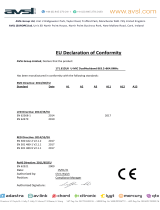
Doc ID
innr-SAR-001-0010
- page 1 of 3 -
Version
1.1
Date
2020-07-05
EU Declaration of Conformity
We,
Innr Lighting B.V.
Heuvellaan 50
1217 JN Hilversum
The Netherlands
declare under our sole responsibility for the product(s):
Model Number
Description
OFL 120 C
Zigbee 2m Outdoor Flexible LED Strip, RGBW, with IZCB v1 and power supply
OFL 140 C
Zigbee 4m Outdoor Flexible LED Strip, RGBW, with IZCB v1 and power supply
that the designated product(s) is/are in conformity with the essential requirements of the following
European Directives, by compliance with the following Harmonized Standards and other specifications
referred to by those Directives:
2014/35/EU Low Voltage Directive (LVD)
EN 60529:1989+A1:1999+A2:2013; Degrees of protection provided by enclosures (IP Code)
EN 60598-1:2015+A1:2018; Luminaires - Part 1: General requirements and tests
EN 60598-2-21:2015; Luminaires - Part 2-20: Particular requirements – Rope lights
EN 61347-1:2015; Lamp controlgear - Part 1: General and safety requirements
EN 61347-2-13:2014+A1:2017; Lamp controlgear - Part 2-13: Particular requirements for d.c. or
a.c. supplied electronic controlgear for LED modules
EN 62031:2008+A1:2013+A2:2015; LED modules for general lighting - Safety specifications
EN 62471:2008; Photobiological safety of lamps and lamp systems
IEC TR 62778:2014; Application of IEC 62471 for the assessment of blue light hazard to light
sources and luminaires
EN 62493:2015; Assessment of lighting equipment related to human exposure to electromagnetic
fields
DIN VDE 0620-2-1:2013; Plugs and socket-outlets for household and similar purposes Part 2-1:
General requirements on Plugs and portable socket-outlets, in conjunction with DIN VDE 0620-
1:2010; Part 1: General requirements
BS 1363-1:1995+A4:2012; 13 A plugs, socket-outlets, adaptors and connection units. Specification
for rewirable and non-rewirable 13 A fused plugs
2014/30/EU Electro Magnetic Compatibility (EMC) Directive
ETSI EN 301 489-1 V2.2.1:2019; ElectroMagnetic Compatibility (EMC) standard for radio
equipment and services; Part 1: Common technical requirements

Doc ID
innr-SAR-001-0010
- page 2 of 3 -
Version
1.1
Date
2020-07-05
2014/30/EU Electro Magnetic Compatibility (EMC) Directive
o EN 55015:2013+A1:2015; Limits and methods of measurement of radio disturbance
characteristics of electrical lighting and similar equipment
EN 61000-3-2:2014; Electromagnetic compatibility (EMC) - Part 3-2: Limits - Limits
for harmonic current emissions
EN 61000-3-3:2013; Electromagnetic compatibility (EMC) - Part 3-3: Limits -
Limitation of voltage changes, voltage fluctuations and flicker in public low-voltage
supply systems
o EN 61547:2009; Equipment for general lighting purposes - EMC immunity requirements
EN 61000-4-2:2009; Electromagnetic compatibility (EMC) - Part 4-2: Testing and
measurement techniques - Electrostatic discharge immunity test
EN 61000-4-3:2006+A1:2008+A2:2010; Electromagnetic compatibility (EMC) - Part
4-3: Testing and measurement techniques - Radiated, radio-frequency,
electromagnetic field immunity test
EN 61000-4-4:2012; Electromagnetic compatibility (EMC) - Part 4-4: Testing and
measurement techniques - Electrical fast transient/burst immunity test
EN 61000-4-5:2014; Electromagnetic compatibility (EMC) - Part 4-5: Testing and
measurement techniques - Surge immunity test
EN 61000-4-6:2014+A1:2015; Electromagnetic compatibility (EMC) - Part 4-6:
Testing and measurement techniques - Immunity to conducted disturbances,
induced by radio-frequency fields
EN 61000-4-11:2004; Electromagnetic compatibility (EMC) - Part 4-11: Testing and
measurement techniques - Voltage dips, short interruptions and voltage variations
immunity tests
ETSI EN 301 489-17 V3.2.0:2017; ElectroMagnetic Compatibility (EMC) standard for radio
equipment; Part 17: Specific conditions for Broadband Data Transmission Systems
2014/53/EU Radio Equipment Directive (RED)
ETSI EN 300 328 V2.1.1:2016; Wideband transmission systems; Data transmission equipment
operating in the 2,4 GHz ISM band and using wide band modulation techniques
ETSI EN 300 440-1 V2.1.1:2017; Short Range Devices (SRD); Radio equipment to be used in the 1
GHz to 40 GHz frequency range
ETSI EN 301 489-3 V2.1.1:2019; ElectroMagnetic Compatibility (EMC) standard for radio
equipment and services; Part 3: Specific conditions for Short-Range Devices (SRD) operating on
frequencies between 9 kHz and 246 GHz; Harmonised Standard covering the essential
requirements of article 3.1(b) of Directive 2014/53/EU
EN 62311:2008; Assessment of electronic and electrical equipment related to human exposure
restrictions for electromagnetic fields (0 Hz-300 GHz)
2009/125/EC Ecodesign Requirements for Energy-related Products (ErP) Directive
Commission Regulation (EC) No 1194/2012 of 12 December 2012; implementing Directive
2009/125/EC of the European Parliament and of the Council with regard to ecodesign
requirements for directional lamps, light emitting diode lamps and related equipment

Doc ID
innr-SAR-001-0010
- page 3 of 3 -
Version
1.1
Date
2020-07-05
2009/125/EC Ecodesign Requirements for Energy-related Products (ErP) Directive
Commission Delegated Regulation (EU) No 874/2012 of 26 September 2012; supplementing
Directive 2010/30/EU of the European Parliament and of the Council with regard to energy
labelling of electrical lamps and luminaires
2011/65/EU Restriction of the use of certain Hazardous Substances in electrical and electronic
equipment (RoHS) Directive, and 2015/863/EU amending Annex II to Directive 2011/65/EU
EN 63000:2018; Technical documentation for the assessment of electrical and electronic products
with respect to the restriction of hazardous substances
IEC 62321-3-1/4/5/6/7-1/7-2/8:2013-2017; Determination of certain substances in
electrotechnical products, Parts 3-1, 4, 5, 6, 7-1, 7-2, and 8
The CE mark was first applied in 2020.
Signed:
Rob Timmer
COO Innr Lighting B.V.
Heuvellaan 50
1217 JN Hilversum, The Netherlands
Date: 2020-07-05.
-
 1
1
-
 2
2
-
 3
3
Innr Spot Extérieur LED Connecté x3 Product information
- Type
- Product information
- This manual is also suitable for
Ask a question and I''ll find the answer in the document
Finding information in a document is now easier with AI
Related papers
Other documents
-
TP-LINK TL-WR842ND V1 Declaration of conformity
-
Qtx 178.859UK Stereo Portable PA Set User manual
-
AV:Link ABS35 User manual
-
 Avsl 171.812UK U-Mic Wireless UHF Microphone Kit User manual
Avsl 171.812UK U-Mic Wireless UHF Microphone Kit User manual
-
Qtx 178.859UK Stereo Portable PA Set User manual
-
Adastra SA240-953.150UK User manual
-
Chord IEM58 In-Ear Monitoring System User manual
-
Chord IEM58 In-Ear Monitoring System User manual
-
Adastra AS-4 User manual
-
Adastra RMC120 SERIES User manual



